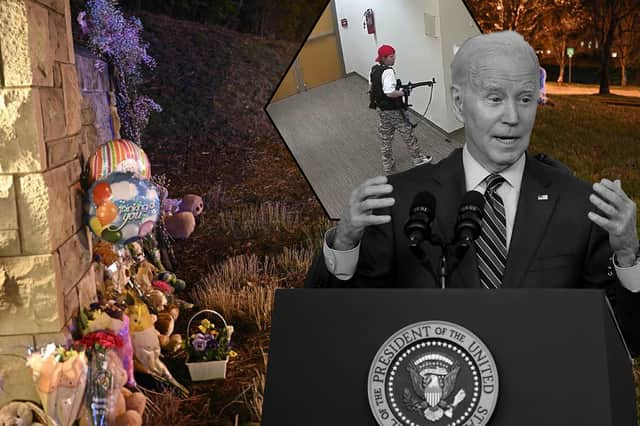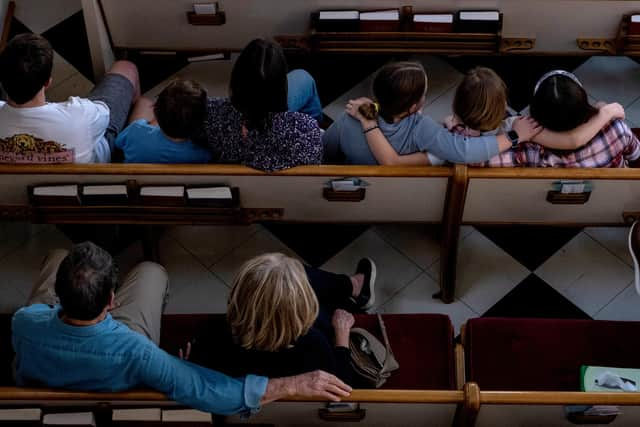Nashville shooting: President Biden again calls for an assault weapon ban - current US gun laws explained
This article contains affiliate links. We may earn a small commission on items purchased through this article, but that does not affect our editorial judgement.
and live on Freeview channel 276
After yet another deadly mass shooting targeting schoolchildren, the US is once again left grappling with one of its most complicated questions - how do you make meaningful changes to gun laws, in a country where one in three people owns a firearm?
Emergency services raced to The Covenant School - in Nashville, Tennessee - on Monday morning, where the suspect was killed by police in a confrontation after the shooting. Among their victims were three nine-year-old children, and three adults in their sixties, officials report.
Advertisement
Hide AdAdvertisement
Hide AdPolice said they believe the shooter was 28-year-old Audrey Hale, a former student, who was armed with two assault-type rifles and a pistol.
US President Joe Biden quickly called on Congress to pass an assault weapons ban, Reuters reports, saying: "We have to do more to stop gun violence. It’s ripping our communities apart."
But the President has made the same call for stricter gun regulations before, after a gunman slaughtered 19 children and two teachers at a Texas elementary school just last year. What has changed since then, and what challenges do lawmakers face trying to change gun laws in the US?


How have gun laws changed since the Uvalde shooting?
A month after the shooting, in a fourth grade classroom at Robb Elementary School in Uvalde, Texas, President Biden signed new bipartisan gun legislation into law - heralded by US media as the most significant gun measure passed by Congress in nearly 30 years.
Advertisement
Hide AdAdvertisement
Hide AdThe Texas Tribune reported at the time that the law was a series of modest changes to current gun regulations, falling far short of the initial proposals put forward by Biden and House Democrats, which included bids to raise the age people were able to purchase a gun, and a ban on assault weapons.
The most noteworthy provision of the law closed what is known as "the boyfriend loophole". While current federal statutes already stopped people convicted of committing domestic violence against spouses or partners who either lived together or shared a child from buying a firearm, the new law gave the courts more flexibility around how to define dating partners who might qualify for the ban.
The law also incentivised states to impose red flag laws, which allow guns to be temporarily confiscated from people found by a judge to be dangerous. But many southern states - including Texas - were unlikely to adopt these laws due to conservative backlash, the Tribune said.
The New York Times reported other clauses in the new legislation expanded the background check system for prospective gun buyers under the age of 21 - giving authorities 10 business days to examine applicants' juvenile and mental health records. It also set aside millions of dollars for mental health resources in communities across the country and for school safety, while toughening up gun trafficking laws.


What challenges do US politicians face trying to reform gun laws?
Advertisement
Hide AdAdvertisement
Hide AdThe enactment of Biden's new gun legislation came the same week that the Supreme Court struck down a New York law limiting where gun owners could carry a firearm outside the home, citing the Second Amendment.
The Second Amendment of the US Constitution gives its citizens the right to "bear arms". The original text of the amendment reads: “A well regulated Militia, being necessary to the security of a free State, the right of the people to keep and bear Arms, shall not be infringed.”
It was proposed to provide a constitutional check on congressional power, and passed in 1789 with nine other amendments, together called the Bill of Rights. The amendment allows US citizens to this day to carry and purchase weapons, with each state having its own set laws on background checks and the type of firearms available.
The amendment is entrenched in the consciousness of many Americans as a core value required for freedom. Attempts at enacting federal gun control laws are often challenged on this basis, as a government attempt to remove that public check on their power.
Advertisement
Hide AdAdvertisement
Hide AdThere are also powerful, well-funded lobby groups in the United States advocating for gun rights - like the National Rifle Association (NRA) - among the most influential in US politics. The group has influenced legislation, participated in or instigated lawsuits, and endorsed or opposed political candidates at state and federal levels throughout its history.
It has frequently been targeted by gun control groups, political commentators, and politicians in the aftermath of high-profile shootings, and since the 1990s, the NRA has been increasingly closely associated with the Republican party.
Currently, the US House and Senate are split, with the Republicans holding the most seats in the House of Representatives, and the Democrats controlling the Senate. Every president since 1980 has faced a divided government at some point during their term.
A bill must pass both houses of Congress before it goes to the President for consideration, so this division means any legislation that passes usually has to be a compromise between the values of both parties.


What do the current gun laws in the US allow?
Advertisement
Hide AdAdvertisement
Hide AdAccording to the Council on Foreign Relations, the Second Amendment is not unlimited. US Congress and state legislatures both have authority to enact controlling legislation.
Currently, the Gun Control Act 1968 prohibits individuals under eighteen years of age, convicted criminals, the mentally disabled, and dishonourably discharged military personnel from purchasing firearms. In 1993, the Brady Handgun Violence Prevention Act mandated background checks for all unlicensed individuals purchasing a firearm from a federally-authorized dealer.
States and cities can impose further restrictions on their residents, and some - like California and Hawaii - have much higher levels of gun control.
As of mid-2022, there were no federal laws banning semiautomatic assault weapons, military-style .50 caliber rifles, handguns, or large-capacity magazines. There was also no federal requirement for those purchasing a gun to have any firearm safety training. There was a federal prohibition on assault weapons and on large-capacity magazines between 1994 and 2004, but Congress allowed this to expire.
What does President Joe Biden want to change in the aftermath of the Nashville attack?
Advertisement
Hide AdAdvertisement
Hide AdIn the aftermath of the attack, Biden said: "I call on Congress again to pass my assault weapons ban."
The ban in question was most recently re-introduced by California's Democrat Senator Dianne Feinstein in January, in the wake of two deadly shootings in her state. The Assault Weapons Ban would prohibit the sale, manufacture, transfer and importation of 205 military-style assault weapons by name. Owners could keep their existing weapons.
It banned any semi-automatic rifle that could accept a detachable magazine, and had at least one military feature - like forward grip, telescoping, grenade or rocket launchers - as well as banning magazines and other ammunition feeding devices that hold more than 10 rounds of ammunition, allowing shooters to quickly fire many rounds without needing to reload.
The bill would require a background check on any future sale, trade or gifting of an assault weapon, and would requires that grandfathered assault weapons were stored securely, or using a safety device like a trigger lock.
